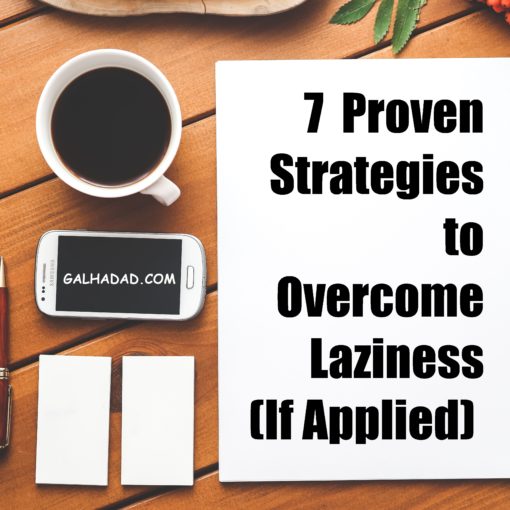
They always say:
“Be Positive!”
“Every morning routine should include positive affirmations!”
“Think good and it’ll be good!”
But, Is it really a good advice for someone who wants to achieve their goals?
Not necessarily.
Well, I agree that positive thinking may increase well-being, but who said that well being always correlates with success (aka achieving your goals)? To put it nicely, it doesn’t.
Are there hidden consequences to that roses and rainbows mindset where everything in the future is just flawless?
How could Positive Thinking secretly hold you back from getting what you want in life?
And, Is there a better alternative?
These are interesting questions to explore, because it’s an area most of us are taking for granted and blindly believing the gurus, without questioning whether or not it has a negative impact on our lives. After all, it has the word ‘positive’ in it, so it must be all-good, right?
Wrong.
In this article I am going to open your mind to a different perspective of why would one be concerned with such a so-called good habit of being positive all the time.
You might think to yourself:
“Are you telling me I need to be negative instead? No way I am going to listen to you”.
Well, I am not telling anyone to be negative. There is nothing good or beneficial with being negative, unless you are a masochist of course. The good news is that I found an alternative.
I have been curious about this topic for a long time so I did some research and am going to share with you in this specific article my unexpected findings. You’ll be surprised by what I’ve found, so let’s start:
There is no such thing as a free lunch.
Before I am about to ruin the reputition of Positive Thinking entirely, let me shed some light on the good side of it, because it will be unfair to not discuss the other side of the coin.
Positive thinking might be good for your mental health and have several benefits, such as:
- Better overall health
- Less stress
- More relaxed and calm mind
- Better immune system
- Less reactive
- More effectively coping with negative situations, including negative people
- Emotional stability throughout the day
- Less likely to be depressed
- Fewer worries, fewer headaches
- Less depending on the outcome (which is important for success as well)
- Having more time and room in your head to learn and grow instead of dwelling on past mistakes
Having said that, you may ask yourself – “What’s dangerous here? it seems like a purely healthy habit to adopt.”
That’s where balance kicks in and become so important.
When used correctly and in right amount, positive thinkers might experience a ton of benefits, no doubt on that.
However, as with other things in life, too much of a good thing can become a bad thing.
So When and How Positive Thinking Become a Bad Thing?
When misused, a positive thinker may find themselves less eager to pursue their goals and from that point, they’ll slowly take their foot off the pedal.
In other words, it can weaken your motivation muscle, reduce your energy levels and eventually increase the chance that you’ll give up on your goal.
Do you start to see how it may affect your end-goals? I hope it starts to make sense to you.
The whole point of motivation is based on good feelings that are there to ensure you are moving forward toward your goal. When you feel good without moving forward, isn’t it a sophisticated recipe to end up getting nothing?
Think about it, if you always bombard your mind with positive affirmations, you feel good, right?
If you feel good, what does it mean?
Less eagerness, less urgency, less drive, less healthy stress to work towards what’s important to you.
Most of the time, these good feelings will cause you to become more ‘calm’ and ‘relaxed’, completely distancing you from the success you wish to yourself.
You’ll feel like you reached a point where you don’t need to work hard anymore. as you already achieved something.
But.. What did you truly achieve?
Exactly, nothing.
That’s the main problem with positive affirmations. While they might increase your well-being and improve your mood, they secretly make you less motivated and less of a hard worker thus might break your hard-earned momentum. All the energy you’ve accumulated will no longer be there because you wasted it with some positive thoughts that made you feel good for some seconds.
The questions that arise is – Is it worth it? Well being Vs Motivation to succeed.
But… I can control myself and have the discipline to work towards my goal, I want to enjoy the best of both worlds.
No, no, no.
Even if you consider yourself as a strong-minded person who has the ability to self-motivate themselves whenever they want to, this tradeoff between motivation and well-being as a result of positive thinking still applies to you and has a strong impact on you, as I am about to show you right now:

How Actually Positive Thinking Kills Your Motivation
*Explained from a physiological standpoint
As discussed earlier, feeling good is nothing but our brain’s way to tell us we did something we should be doing in order to survive or procreate, which makes sense from an evolutionary standpoint.
Things we pursue that come to mind in that context are:
- Food
- Sex
- Sense of belonging to a community (acceptance from others)
- Sense of purpose (in the form of self-development)
The more we get warm feelings from one of those goals (in the form of dopamine release), the less we are eager to pursue the others, regardless of how much we need the others at a particular moment (to survive, for example).
Let me explain to you what I mean by that.
When we pursue these goals (food, sex, acceptance from others, etc.), dopamine is released.
In today’s environment, more than ever, dopamine can be extremely dangerous. We have so many artificial sources of dopamine that we became addicted to, such as sugar, alcohol, cigarette, social media, screens, etc.
Our ancestors weren’t exposed to so many dopamine sources as we do, therefore they weren’t at risk of unhealthy addictions. Researches have shown that when we ‘play’ with our reward system, and manipulate them in unnatural ways – we give ourselves a false sense of accomplishment, and we might find ourselves neglecting our natural sources of dopamine – such as food, as long as we get that dopamine rush from elsewhere.
Yeah, It’s that addictive.
That’s why it’s not uncommon, for example, to hear about people who died from too much video-games, after they’d neglected their basic needs. They didn’t sleep, eat, drink, and even go to pee.
It’s crazy, isn’t it?
We should be fully aware and cautious when it comes to where we’re getting our boost of dopamine from. The more artificial the source is, the more likely it’s going end up as a dangerous addiction.
Positive thinking is another source of dopamine, though it’s natural. But when you constantly bombard your mind with those good feelings, that based on zero achievements, in the form of positive affirmations – what do you think will happen to your drive?
What do you think will happen to your enthusiasm? Increase? Decrease?
Unfortunately, it’s definitely going to slacken your readiness to chase your goals, and you may give up as a result.
But hey, you’re here for the good news, aren’t you?
Is there a better alternative that is not “Think negative!”?
Fortunately, there is.
A Better Alternative For Positive Thinking: Mental Contrasting
Meet Mental Contrasting, a better strategy than being overly positive.
Mental contrasting is when you balance out the positivity of regular positive thinking by implementing some visualizations of future difficulties and how you can overcome them.
Let’s say you have a goal to write 30 Articles a month, meaning each day having an article published, which is not easy at all.
You are not only focusing on the best outcome, and fantasizing on your daily article being published in its best quality, sure you do it to some extent, but what you also do is thinking about potential future obstacles, in this example – a writer’s block that might occur, and how you are going to win it – “I won’t let my mind to be stuck, I will go for a walk, go for a run, I will change my environment and will optimize whatever in my control to prevent that writer’s block from occurring”.
This strategy is far more goal-friendly than over bombarding your brain with positive thinking all the time. It has much more balance and this way you will not only be more connected to reality, but you’ll be more driven to actually keep pushing forward with your day-to-day actions, and false feelings of achievement won’t be an issue anymore.
Putting it all together
While positive thinking may be beneficial in terms of well-being, it’s not necessarily the case with success. It can weaken your motivation muscle due to dopamine imbalance. When achieving your goals become important to you more than well being, it’s time to consider another strategy, known as mental contrasting. It’s far more balanced, and instead of super, unrealistic positive fantasies all day long you also give a thought about potential future obstacles and problems that might interfere with your progress towards your goal and obviously think about different solutions to that obstacles
PS – If you found this interesting, I think you might be also interested in Gabriele Oettingen’s great book “Rethinking Positive Thinking: Inside the New Science of Motivation”. In his book, he dives more deeply into the how-to side of this strategy called mental contrasting and he gives really useful practical tips. I highly recommend you to check it out.
Until next time,
Gal.




5 thoughts on “Why Positive Thinking is Dangerous (And What to Do Instead)”